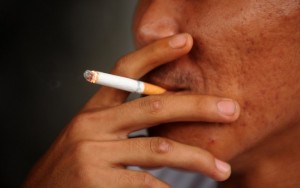
A man holds a cigarette as he smokes in his house in Manila in this file photo. The Japan Tobacco International Philippines Inc. said a rise in tobacco tax would not curb the incidence of smoking but would only increase consumption of cheap, smuggled cigarettes. AFP PHOTO/NOEL CELIS
MANILA, Philippines—The Japan Tobacco International Philippines Inc. (JTIP), which produces Winston, Mild Seven, Camel and Salem cigarette brands, has contradicted the popular view that the proposed hike in tobacco tax would help discourage people from smoking.
Hoping Congress would junk the bill seeking to slap much higher taxes on cigarettes, JTIP said a rise in the taxes would not curb incidence of smoking but would only increase consumption of cheap, smuggled cigarettes.
“While tobacco consumption carries health risks, the demand for cigarettes will remain, even after a change in tax. As a consequence, consumers would no longer be able to afford legitimate brands and they will tend to buy much cheaper, non-duty or tax paid cigarettes or, worse, counterfeit products, which are not subject to any quality controls,” Manos Koukourakis, JTIP general manager, said in a statement.
Koukourakis said that in other countries, such as Ireland and Malaysia, where cigarette taxes were raised, the incidence of smoking did not change.
JTIP is lobbying for legislators to consider either going against the popular intention of raising cigarette taxes or to implement a much smaller rate of increase. Under the proposal in Congress, cigarette taxes should be raised by 150 to 708 percent.
“We hope that the Senate will consider the negative impacts of imposing steep tax increases. We welcome moderate and predictable excise increases that will ensure that legitimate brands are not edged out by cheap, smuggled and counterfeit cigarettes,” Koukourakis said.
The Department of Finance (DoF) is pushing for the passage of the bill seeking to slap much higher taxes on cigarettes.
Besides the objective of reducing the incidence of smoking, the intention of raising more revenues for the government is another factor behind the push for higher cigarette taxes.
Currently, the Philippines is said to have some of the lowest rates of cigarette taxes in the world.
The DoF believes that raising cigarette taxes in the Philippines to be at par with those in other countries will substantially boost government revenues, thereby increasing the capacity of the state to spend more for infrastructure and social services.